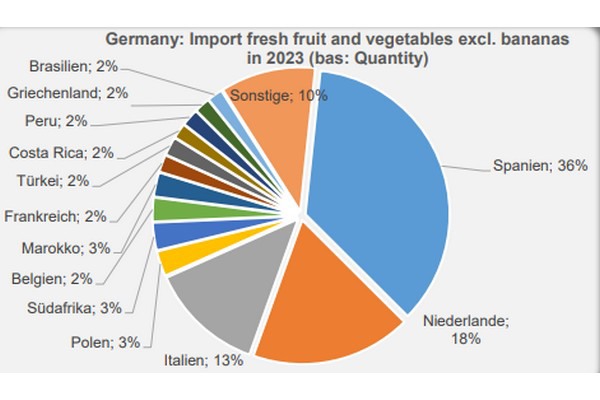After a sharp drop in Germany's import of fresh fruits and vegetables in 2022, that shrank slightly again this year. In 2023, imports will amount to about 8.38 million tons, compared to 8.54 million last year and 9.2 million tons in 2020 and 2021. This trend can be entirely attributed to fewer imports from Germany's two main suppliers, Spain and the Netherlands.
Higher value
Despite the smaller volume, the value of German fresh fruit and vegetable imports is higher. In 2021 and 2022, it was around €12.5 billion. This year it will be roughly €13.5 billion. That means the average range is at least 10% pricier. The 2023 estimate is based on the development of German imports of fresh fruit and vegetables in the first ten months, according to the German CBS (Statisches Bundesambt; SBA).
Usually, around 85% of the annual total is realized in that time. The SBA registers the country of origin and not, as Eurostat does, the country the goods came from. So, for the Netherlands, those SBA figures do not include re-export, though, in practice, that is not entirely the case. Regardless, the SBA figures are a good indication of how German imports of Dutch-grown products are doing.
Limited number of growers
Bananas, tomatoes, and cucumbers, with respective imports in 2023 of 1.29 million, 650 000, and 570 000 tons, are the three main German import products. In 2021, the most of these three were imported, but it was less after that. At 460,000 tons, apples are also a large import item, but Germany imported significantly fewer of these in 2023.

Within the German import assortment, there are a few products - grapes, avocadoes, and mangoes - of which record volumes were imported in 2023. Unusually, German blueberry imports have not increased.
In a short time, 200,000 tons less from the Netherlands
The SBA reports that German imports from the Netherlands will amount to approximately 1.28 million tons this year. Last year, that was 1.32 million tons and 1.65 million tons in 2021. In 2020, at 1.92 million tons it was slightly more. Dutch imports have generally decreased by 14% in a few years.
In quantity, that is more than 200,000 tons. Of that, the 100,000 tons fewer tomatoes are the most important (385,000 tons to 290,000 tons). With Dutch cucumbers, it is a drop of 25,000 tons, from 243,000 to 217,000 tons, and bell peppers are down 16,000 tons, from 132,000 to 116,000 tons.
Germany also imports plenty of Dutch carrots - 115,000 tons. There is no clear trend for this product. However, in 2023, Germany imported a record volume of onions - 90,000 tons - from the Netherlands. The sharp decline in Germany's import of both Dutch apples and pears is noteworthy.
Nearly 400,000 tons less from Spain
Regarding German imports from Spain, oranges and mandarins are the two largest, and the imports of both again declined sharply in 2023. Imports of Spanish cucumbers and watermelons remained stable this year after the sharp decline in 2022. Spanish peaches and nectarines imports recovered remarkably well. But, this year, Germany again imported fewer Spanish bell peppers and tomatoes.
More from South Africa, Morocco, Greece, Brazil, and Egypt
As for imports from other countries, Italian products are also increasingly doing worse on the German market. In 2023, imports from that country fell to about 912,000 tons, five percent less than in 2022. Before that, Germany imported more than a million tons of Italian fresh fruits and vegetables. Among the reasonably important suppliers of fresh fruits and vegetables (excluding bananas) to Germany, South Africa, Morocco, Greece, Brazil, and Egypt managed to sell more to that country in 2023.
Click here for the background figur.es
For more information:
Jan Kees Boon
Fruit and Vegetable Facts
www.fruitandvegetablefacts.com
fruitvegfacts@gmail.com
